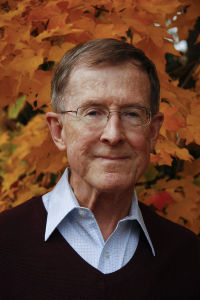An American leader in the innovation of supports for older people

Terry's unique strategies for supporting, personalizing and protecting the rights of older people are presented in his ground-breaking book, But I Don’t Want Eldercare! and his powerful essay, Keep the Flame Burning and other material published by Citizen Network Research. Terry was engaged in a project in his home state, Wisconsin, to expand the number of older people who are self-directing their support and to enhance their capacity for building rewarding lives as respected members of their communities.
Terry had been promoting the independent living cause since 1977, when he served as Assistant to the Director of the White House Conference on Individuals with Disabilities. He then managed a federal government disability rights program and had a key role in the establishment of the National Disability Rights Network.
Terry returned to Wisconsin in 1985 to begin his consulting and speaking business. He soon began living his work. For the next 10 years, Terry helped his mother remain at home, in control of a meaningful life, overcoming challenging medical problems and a life-changing memory disorder. His writing and his work in the self-determination movement was grounded in this illuminating personal experience, as well as his work with other families.
Wisconsin Governor Jim Doyle appointed Terry to the state’s Board on Aging and Long-term Care in 2006 and to its Quality Home Care Authority Board in 2009. Terry was a Board member of a national advocacy organization dedicated to elevating the status and wages of direct care workers and was engaged in shaping policy advocacy for the Alzheimer’s Association of Southeastern Wisconsin. He was a founding member of In Control Wisconsin.
Terry Lynch passed away peacefully at Agrace Hospice in Fitchburg, Wisconsin on September 10. He was 84. Terry was a remarkable man: Athlete, Sports Fan, Scholar, Army Reservist, Public School Teacher, Advocate, Federal Civil Rights Official, Author, Consultant, Trainer and Cat Lover.
He grew up in Racine, Wisconsin, where he learned to play golf with his dad, worked in his dad’s shoe store, and played basketball at Washington Park High School. He studied at University of Wisconsin-Madison, earning a Bachelor’s Degree in Economics and a Master’s Degree in History and Education. He entered Basic Training in 1960 and served in the Army Reserve for 6 years. He taught high school Social Studies in Neenah, Wisconsin from 1963 to 1966.
From 1968 to 1973, Terry worked for the U.S. Dept. of Education in the Civil Rights Unit. He was part of a team which visited school districts in the South to confirm that they were complying with federal law in their education and desegregation of low-income students, most of whom were African-American. It was dangerous but important work, and Terry was proud of what he and his colleagues were able to accomplish.
From 1978 to 1985, Terry was the first Manager of the federal Developmental Disabilities Protection and Advocacy Program. In that job, he was involved in developing the policies that would shape this program in every state. He also got to know many disability rights leaders throughout the United States.
Terry returned to Wisconsin in 1985 to coordinate the in-home care his mother Leila needed to continue to live in her own home and not have to move into a nursing home. With Terry’s loving care, Leila was able to remain in her own home for the last 10 years of her life, significantly healthier, happier and more connected to her community than would otherwise have been possible. He learned many important lessons from that experience which he incorporated into the book he wrote in 2008: But I Don’t Want Eldercare. This also marked the start of the next chapter of his career, in which he provided consultation and training to agencies, local governments, and individual families across the United States and in the United Kingdom on how to maximise the quality of life for older people living at home or in the community, and help people stay out of an institution. Terry also served on many local, state-level and national Boards and committees.
Notwithstanding his professional accomplishments, Terry’s greatest gift and his most important legacy is the amazing number and variety of long-standing friendships he established with people across the country. This became especially clear in the last four years of his life when many old and dear friends, first in Racine and then Madison, came together to help him find the best medical treatment and care possible and to share time, bourbon, coffee, beer, music, sports, laughter and memories.
In the last two weeks of his life, a steady stream of visits, calls and texts was a testament to the positive impact he had on so many people.